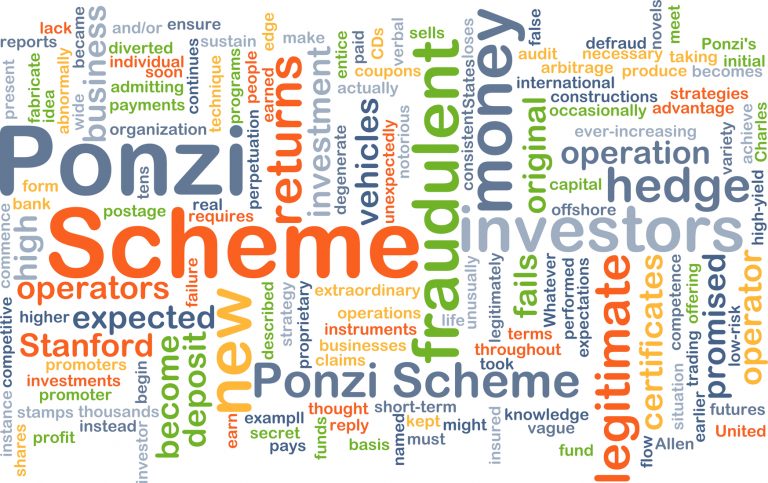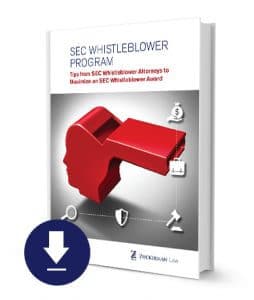Ponzi Schemes
The SEC defines a Ponzi scheme as “an investment fraud that involves the payment of purported returns to existing investors from funds contributed by new investors.” The fraudsters are able to keep the scheme running only by attracting new money to make promised payments to earlier-stage investors, thereby creating the false appearance that investors are profiting from a legitimate business. The schemes tend to collapse when the fraudsters are unable to recruit new investors or when a large number of investors ask to cash out.
SEC Whistleblower Program Rewards Whistleblowing About Ponzi Schemes
Under the SEC Whistleblower Program, whistleblowers may be eligible for monetary awards when they voluntarily provide the SEC with original information about violations of federal securities laws, including Ponzi schemes, offering fraud, and many other violations. If a whistleblower’s tip leads to a successful enforcement action resulting in monetary sanctions of more than $1,000,000, the whistleblower is eligible to receive between 10% and 30% of the monetary sanctions collected.
The SEC Whistleblower Program also protects the confidentiality of whistleblowers and does not disclose information that might directly or indirectly reveal a whistleblower’s identity. In fact, whistleblowers can even submit a tip anonymously if represented by counsel.
Since the law went into effect, the SEC Whistleblower Office has awarded more than $1.7 billion in awards to whistleblowers, which includes awards to our clients totaling millions of dollars. The top SEC whistleblower attorneys can provide critical guidance to whistleblowers throughout this process to protect their identities and increase the likelihood that they not only obtain, but maximize, their awards.
SEC Cracking Down on Ponzi Schemes
According to a speech by former SEC Enforcement Director Andrew Ceresney, Ponzi schemes and offering fraud are the types of cases where whistleblower assistance is especially critical. The Director noted that whistleblowers have helped the SEC identify Ponzi schemes and false and misleading statements in offering memoranda and marketing materials, which enables the agency to act quickly and prevent investment frauds from luring more investors. Recent examples highlighted in an SEC alert include:
- SEC Charges South Florida Man in Investment Fraud Scheme.
Fraudster raised nearly $11 million claiming returns as high as 26%. He typically met and pitched prospective investors over meals at expensive restaurants in and around Fort Lauderdale. His clients typically came to him through word-of-mouth referrals among friends and relatives. A significant number of the victims of his scheme were members of the gay community in Wilton Manors, Florida.
- SEC Charges Real Estate Developer in Miami Affinity Fraud. Miami-based developer conducted an affinity fraud and Ponzi scheme involving real estate investments that raised $135 million from more than 400 investors, primarily from the South Florida Cuban exile community. Among other things, the developer paid existing investors with new investors’ funds and assigned the same real estate collateral to multiple investors.
- In April 2017, a federal judge granted a bid by the SEC to force former head fund manager Francisco Illarramendi to pay nearly $27 million for his role in a Ponzi scheme. According to the court’s order, Illarramendi was the mastermind behind an elaborate five-year scheme to cover up a $5 million investment loss. Rather than disclosing this loss to investors, Illarramendi tried to “raise as much money as possible to be able to make it so that the gains from . . . the additional money would eventually cover the loss.” Illarramendi’s sheme was unsuccessfully and only served to increase the amount of mismanagement between assets and liabilities to approximately $30 million.
Warning Signs of a Ponzi Scheme
The SEC compiled a list of red flags that are common to most Ponzi schemes. These warning signs include:
- high investment returns with little or no risk;
- overly consistent returns;
- unregistered investments;
- unlicensed sellers;
- secretive and/or complex strategies;
- issues with paperwork; and
- difficulty receiving payments.
Click here to see a SEC investor alert about Ponzi schemes targeting seniors.
See our recent article How to Report a Ponzi Scheme and Earn an SEC Whistleblower Award.
SEC Enforcement Actions Combatting Ponzi Schemes
In another enforcement action, the SEC charged an investment group and three top executives with hiding the rapidly deteriorating financial condition of the enterprise while raising more than $350 million from investors. In the scheme, the executives defrauded more than 1,500 investors into believing that they were investing in healthcare, education, and transportation, when their money was really being used to keep the firm from going bankrupt. It was considered a Ponzi scheme because some of the money from new investors was used to pay earlier investors.
The operation showed some of the typical warning signs of a Ponzi scheme, such as promising high rates of return that ranged from 8.5% to 10%. In late 2015, the scheme unraveled after the firm could no longer meet scheduled redemptions.
In a separate enforcement action, the SEC charged a real estate company with engaging in a $2.7 million Ponzi scheme that targeted elderly investors. Like many Ponzi schemes, the company “guaranteed income” to investors. This income was purportedly derived from the profits of a Pennsylvania real estate venture that bought, redeveloped, and sold properties. In reality, the company did not operate a real estate venture, and it used the investments for personal expenses, such as purchasing tickets for sporting events, paying college tuition, and maintaining personal credit cards.
Experienced Washington DC SEC Whistleblower Attorneys
The experienced whistleblower lawyers at Zuckerman Law represent whistleblowers worldwide before the SEC under the Dodd-Frank SEC Whistleblower Program. The firm has a licensed Certified Public Accountant and Certified Fraud Examiner on staff to enhance its ability to investigate and disclose complex financial fraud to the SEC, and two of the firm’s attorneys served in high-level position at a federal agency that protects whistleblowers. Firm Principal Jason Zuckerman has been named by Washingtonian Magazine as a “Top Whistleblower Lawyer” and the firm has been ranked by U.S. News as a Tier 1 Firm in Labor & Employment Litigation.
Whistleblower law firm Zuckerman Law has substantial experience investigating securities fraud schemes and preparing effective submissions to the SEC concerning a wide range of federal securities violations, including:
- Accounting fraud;
- Investment and securities fraud;
- EB-5 investment fraud;
- Manipulation of a security’s price or volume;
- Fraudulent securities offerings and Ponzi schemes;
- Unregistered securities offerings;
- Investment adviser fraud;
- False or misleading statements about a company or investment;
- Inadequate internal controls; and
- Violations of auditor independence rules.
To learn more about the SEC Whistleblower Program, download Zuckerman Law’s eBook: SEC Whistleblower Program: Tips from SEC Whistleblower Attorneys to Maximize an SEC Whistleblower Award:
In addition, see the following resources:
Zuckerman Law’s SEC Whistleblower Reward Program FAQ
To schedule a free preliminary consultation, click here or call us at 202-262-8959.
SEC Whistleblower Lawyers










